Founded in 1923 by Dr. Carl Spengler to promote teams from German-speaking portions of Europe who may have been ostracized in the aftermath of World War I, the Spengler Cup is hosted by HC Davos of Switzerland.
The games are held between Boxing Day and New Year's Eve with all games being held at the 7,080 capacity Vaillant Arena in Davos.
The invitees over the history of the tournament are a who's who of of powerful European clubs as well as an eclectic mix of unusual and unexpected teams.
The original winners of the Spengler Cup in 1923 was the Oxford University Ice Hockey Club of England, which was made up of Canadian students. Berlin SC of Germany won the second edition in 1924 before Oxford University reclaimed the cup in 1925 and Berlin SC again in 1926.
Hosts HC Davos took their first championship in 1927 and LTC Prague were the first Czechoslovakian winner in 1929 and again in 1930. Diavoli Rossoneri of Milan added Italy to the list of winners in 1934 and repeated in 1935.
An era of Swiss dominance arrived in 1938 when HC Davos took their 4th title. World War II kept the tournament from being played in 1939 and 1940, but Davos picked up where they left off by winning in 1941, 1942 and 1943. Zürcher SC continued the winning Swiss ways in 1944 and 1945, giving Switzerland six titles in a row and seven out of the previous eight.
LTC Prague reeled off three titles in a row from 1946 to 1948 and the tournament was not played in 1949. HC Milano Inter took back to back wins in 1953 and 1954, the last of five titles for Italian clubs. Rudá Hvēzda Brno of Czechoslovakia won in 1955 before the tournament was not held in 1956, the last time the Spengler Cup was not held and one of only four times since 1923 the cup has not been awarded in it's history.
After HC Davos added two more titles in 1957 and 1958, ACBB (Athletic Club Boulogne-Billancourt) Paris won three consecutive cups to add France to the list of winners.
Sparta Prague won in 1962 and 1963 followed by EV Füssen of Germany, who were the last western team to take home the cup for the next 20 years as the Czechoslovakian and Soviet teams would dominate the competition going forward.
Dukla Jihlava would win in 1965, 1966, 1968, 1978 (when the tournament moved indoors for the first time) and again in 1982. HC Slovan Bratislava would win a trio of titles in 1972, 1973 and 1974 for Czechoslovakia along with the Czechoslovak Olympic Team in 1975.
Lokomotiv Moscow would become the first Soviet winner in 1967 and repeat again in 1969 followed by SKA Leningrad in 1970, 1971 and 1977. The USSR B team won in 1976, Krylya Sovetov Moscow (Soviet Wings) in 1979 followed by Spartak Moscow in both 1980 and 1981, with Dynamo Moscow's first title coming in 1983.
1984 saw the debut of Team Canada at the Spengler Cup, which resulted in their first of 14 titles to date. The team representing Canada at the Spengler Cup was originally comprised of the Canadian National Team, a roster which remained together for an entire season under the "Program of Excellence". The Program began in 1983 to represent Canada at such tournaments as the World Championships and the Spengler Cup as well as prepare for the Olympics with a full schedule of games, rather than the current format of All-Star teams who only come together just days before such competitions.
The Canadian "Program of Excellence" lasted until 1998, when the NHL began shutting down to allow it's players into the Olympics every four years, at which point Team Canada at the Spengler Cup began to be comprised of Canadians playing professionally for club teams in Europe and occasionally North American minor leaugers, who were brought together as a squad to stand for Canada.
Spartak Moscow downed Canada in 1985 and the Canadians defeated Soviet clubs in 1986 and 1987 to claim three titles in four years. The United States broke through for their only victory with a "USA Selects" squad in 1988.
Spartak Moscow won the final two times for the Soviet Union in 1989 and 1990 before the political upheaval led to the breakup of the Soviet Union, which saw CSKA Moscow win under the flag of Russia in 1991.
Although Swedish clubs had long participated in Davos, Färjestad BK's wins in 1993 and 1994 were Sweden's first titles following seven runner up finishes dating back to 1950.
The Canadians reeled off four wins in a row from 1995 to 1998, which included the participation of the Rochester Americans of the AHL in 1996, the first North American professional club to take part in the competition. Kölner Haie (Cologne Sharks) then became the first German team to win since 1964 when they took home the title in 1999.
Hosts HC Davos delighted the home fans by winning the tournament for the first time since 1958, a span of 42 years, when they won in 2000 and repeated the feat in 2001.
The Canadians returned to the top in 2002 and 2003 before Davos won again in 2004 before Metallurg Magnitogorsk became the first Russian club to win the tournament in 14 years with their championship in 2005.
Since then, Davos in 2006, Team Canada in 2007 and Dynamo Moscow in 2008 preceded Dinamo Minsk becoming the first team from Belarus to capture the Spengler Cup in 2009, the 12th country represented with a championship.
SKA Saint Petersburg won in 2010, the fourth for the team, as they won three times in the 1970's while known as SKA Leningrad.
the first year for the new version of the championship trophy
HC Davos defeated Dinamo Riga in 2011 to win their fifth title since 2000 after their long drought dating back to 1958.
Still, the other clubs also benefited from having locked out NHL players, as Davos had Joe Thornton, Patrick Kane and Loui Eriksson while Fribourg had goaltender Corey Schneider, Patric Hornqvist, Max Talbot and Bruno Gervais on their roster.
The 2013 edition saw Genève-Servette HC defeat Russian club HC CSKA Moscow by a score of 5-3 in the final for their first ever title.
In 2014, Genève-Servette HC again defeated a Russian club, this time Salavat Yulaev Ufa by a score of 3-0 to finish the tournament undefeated at 4-0.
Last year Team Canada defeated HC Lugano in a close fought affair after Lugano tied the game five minutes into the final period but forward Matt D'Agostini scored later to wrap up the 13th championship for Team Canada.
on the way to their 13th Spengler Cup
This year the participating clubs are, as always, hosts HC Davos, the traditional entry from Team Canada, 2009 Spengler Cup winners Dinamo Minsk of Belarus, second Swiss side and last year's runner up HC Lugano and Avtomobilist Yekaterinburg from central Russia and the KHL.
The sixth and final club this year is the little known Mountfield HK of the Czech Extraliga. The club used to be known as HC Ceske Budejovice prior to relocating to Hradec Kralove in 2013 as the result of a beer sponsorship conflict between the league and the sponsor agreement HC Ceske Budejovice already had in place with their home arena.
Play in Group Torriani saw HC Lugano defeat Avtomobilist Yekaterinburg 4-2. Avtomobilist then lost to Mountfield HK 4-3 after Yekaterinburg led 3-2 entering the third period. The game to decide the group winner and the automatic berth in the semifinals went to Lugano 4-3 after a third period, two goal rally by Mountfield fell short.
Meanwhile, Group Cattini began with Dinamo Minsk hammering Team Canada 7-4 with 4 third period goals after the game was tied 3-3 after two. Team Canada rebounded the next day with a 4-3 win over hosts HC Davos. Minsk had a chance to win the group by getting to overtime against Davos, but fell one goal short as Davos got the win 5-4.
With each team tied with a win and a loss, the tiebreaking formula of goal differential, which went in favor of Minsk thanks to their opening night 3 goal margin of victory over Team Canada. Their one goal defeat by Davos saw them finish group play at +2. With a one goal loss followed by a one goal win, Davos was even and the Canadians could not overcome their three goal loss to Minsk after their narrow one goal win over Davos left them at -2.
The Quarterfinals saw crossover matchups between the second and third place teams in both groups, with HC Davos advancing with a 3-1 win over Yekaterinburg, while Team Canada had an easy time of it with a 5-1 victory over the Czech side Mountfield.
In the Semifinals, Canada broke out to a 2-0 lead over Dinamo, but Minsk got a goal before the second period was even two minutes old. Canada went back up by 2 when Chay Genoway scored at 2:29 of the third period. Minsk did get a power play goal with 4:44 left in the game, but NHLer Ben Scrivens held on for an eventual 3-2 Canadian win to avenge their opening day 7-4 defeat at the hands of Dinamo and move on to today's final.
In the other Semifinal between the two Swiss sides, HC Lugano scored goals in each period to punch their ticket to today's final by shutting out hosts Davos 4-0 to set up a rematch of last year's final won by Team Canada.
Today's final between Team Canada and HC Lugano got off to a dramatic start with Dario Burgler stealing one for Lugano just 31 seconds into the game. Genoway got the Canadians on the board at 6:03 to even the score and the entertaining, high tempo first period ended tied at 1-1 after the teams flew up and down the international sized ice sheet in front of the raucous chanting and clapping Swiss fans.
Canada turned the tables with a goal of their own within the first minute of the second period when Marc-Antoine Pouliot slammed in a crossing pass from Jacob Micflikier to put Canada up 2-1. Then, after a great save by Canadian goaltender Zach Fucale while killing a penalty, Corey Emerson went coast to coast to score a dazzling shorthanded goal to put the Canadians up by 2 at 3-1 before Andrew Ebbett crossing in front of the net redirected another great centering pass, this one from Mason Raymond, to extend their lead to 4-1 after two periods.
Lugano was not going away easily though, and Burglar scored the first goal of the third period and his second of the game from former NHLer James Wisniewski to keep the Swiss side withing striking distance but Fucale held off Lugano for the rest of the game as Lugano outshot Canada 16-11 for the third period. Nick Spaling made the final score 5-2 with an empty net goal with 17 seconds remaining to give Canada their second consecutive and 14th Spengler Cup, leaving them just one back of Davos all-time. Fucale finished with 40 saves.
Today's featured jersey is a 2012 Team Canada Jason Demers jersey as worn when Team Canada won the Spengler Cup when they defeated HC Davos 7-2. Canada's championship in 2012 was the 12th for the Canadians since they began their participation in 1984.
Club teams often wear special jerseys just for the Spengler Cup tournament, resplendent with numerous advertisements of tournament sponsors not normally found on their domestic league jerseys.
Bovine jersey: Today's bovine jersey is a 2013 Spengler Cup Officials Jersey as worn by the referees and linesmen during the 2013 edition of the Spengler Cup. These same jerseys were worn again for the 2014 edition of the tournament as well, but have sadly been retired in favor of traditional stripes in 2015.
Taking the concept of sponsorship a step too far, the Swiss Milk sponsorship goes beyond anything previously seen in the world of ice hockey as the officials customary black and white stripes are replaced by a black and white Holstein cow pattern, compete with a picture of a cow on the front, at the cost of the officials dignity, which one would think would be paramount for them to retain the respect they deserve while officiating high level games of this magnitude.
Udderly bizarre.
Today's video segment begins with highlights of HC Davos winning the Spengler Cup in 2000, ending their 38 year drought. Notice the previous version of the championship trophy with the glass globe on top which was used from 1956 to 2009, which is now on display at the Hockey Hall of Fame in Toronto.

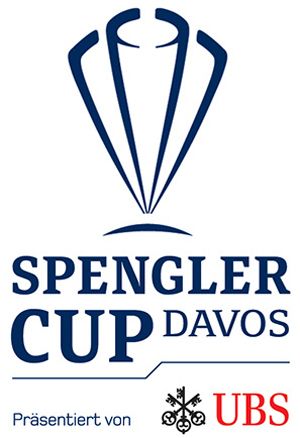
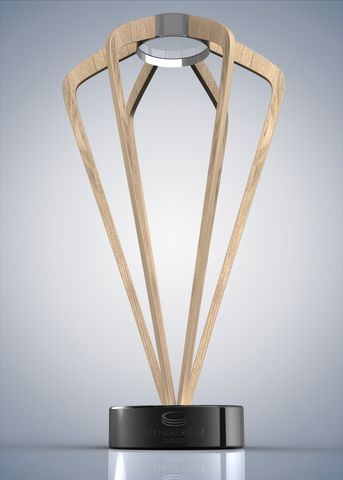
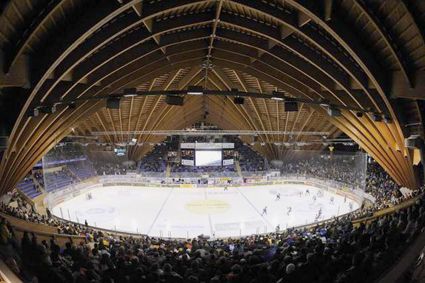
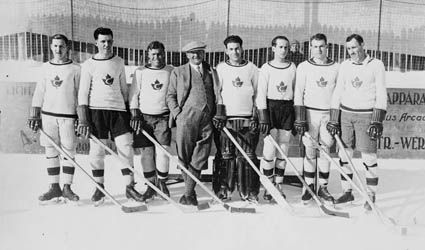
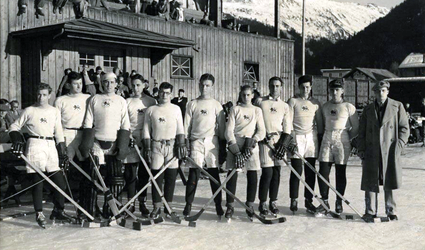
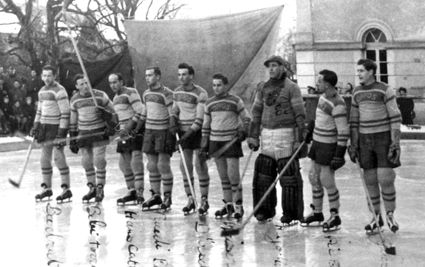
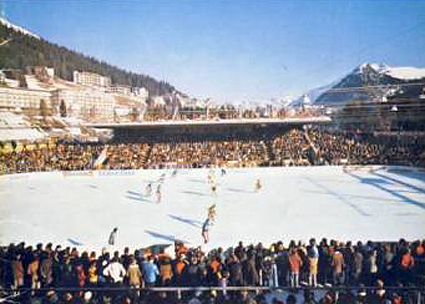
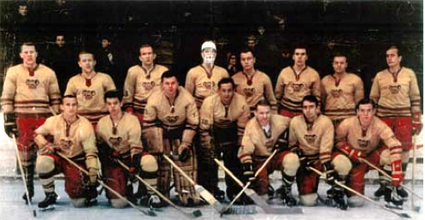
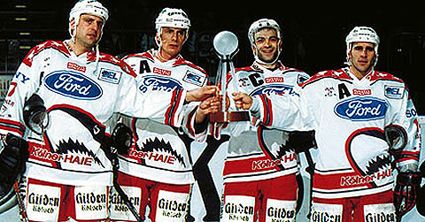
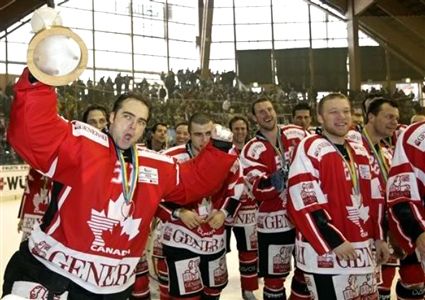
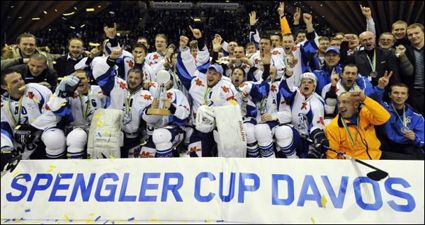
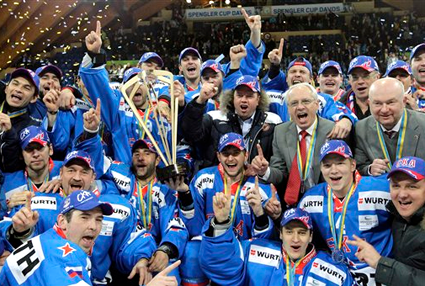
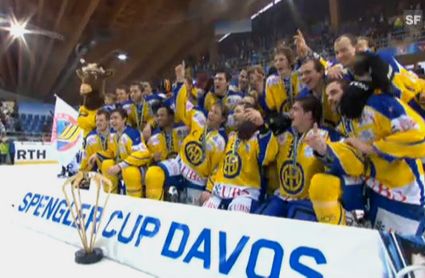
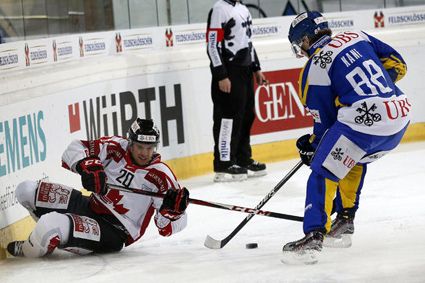
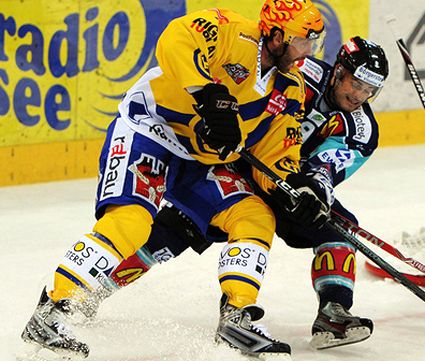
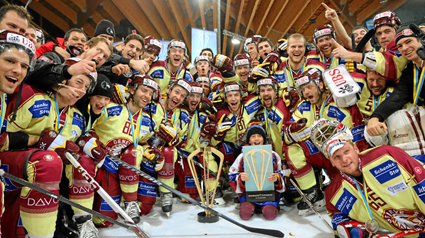
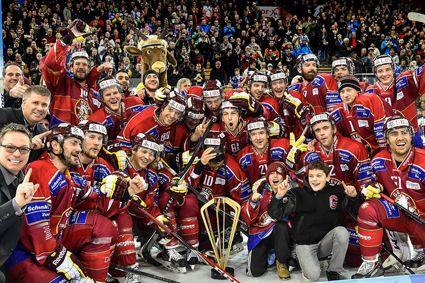
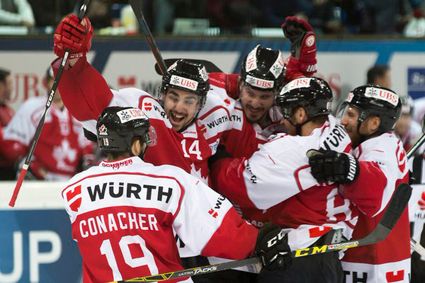
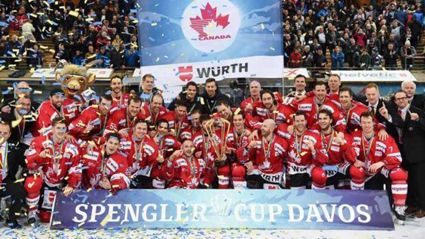
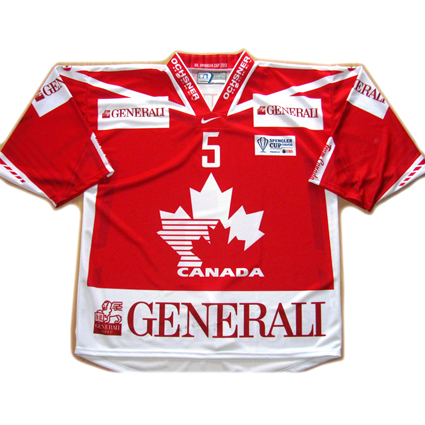
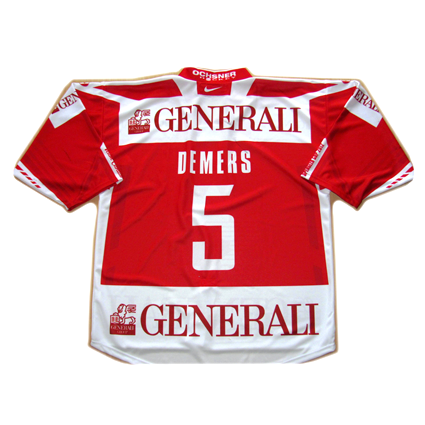
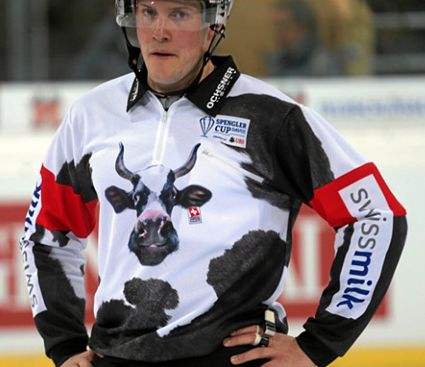
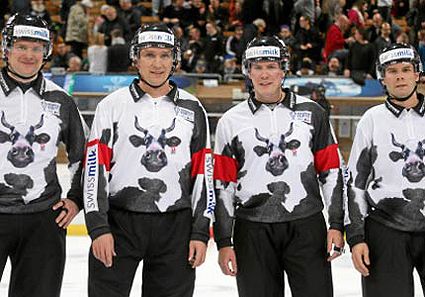










No comments:
Post a Comment
We welcome and encourage genuine comments and corrections from our readers. Please no spam. It will not be approved and never seen.